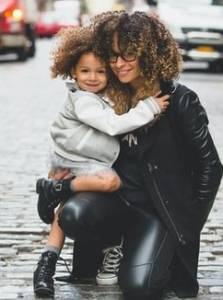 We are all born with a high level of self-esteem.
We are all born with a high level of self-esteem.
As babies, we were absolutely fascinated with ourselves and in love with ourselves. We happily played with our own fingers and toes and loved looking at ourselves in a mirror.
As babies, we all thought we were completely loveable and expected to be loved deeply and unconditionally.
We never wondered if our smiles were cute enough……..if our cheeks were chubby enough… or if our bellies were kissable enough.
As babies, we announced with our entire beings “I’m loveable! I’m sweet! I’m adorable! Love me!”.
As young children, we were all completely impressed with ourselves and considered ourselves to be amazing singers, dancers, artists and performers.
Deep self-love and self-esteem come naturally to us when we are babies and young children. However, as we grow past the baby and toddler stage, and start to compare ourselves with others or have difficult experiences, we tend to begin to doubt ourselves. Self-doubt and low self-esteem can be further exacerbated if parents and teachers compare us unfavorably to our siblings and classmates.
The good news is that it doesn’t have to be this way. As parents, we don’t need to sit by helplessly and watch our children’s self-esteem decline over time.
We have tremendous power to constantly renew and reactivate deep self-love in our children that will last a lifetime.
Cultivate self-esteem with the statements you make
 The statements you make to your children will form and shape their self-image throughout their childhood, adolescence and adulthood.
The statements you make to your children will form and shape their self-image throughout their childhood, adolescence and adulthood.
Think twice about saying “I love you because you’re cute, smart and talented”.
A statement like that may make your children believe that their worth is conditional on their looks, intelligence, talents or abilities. As a result, when your children meet people who are better looking, smarter or more talented, their self-esteem would wither.
It’s far better to say “I love you because you’re so loveable. Everything about you is loveable”. Such a statement would affirm your child with a deep belief that they are innately and unconditionally loveable.
Think twice about saying “I love you more than anyone in the whole world. No one will ever love you more than I do because I’m your mother/father”.
Although a statement like this would make your children secure in your love for them, it may make them doubt that they will be loved and appreciated by people outside of their immediate family. This can also make them doubt that they would find loving partners when they become adults.
It’s far better to say “I love you in a special way because I’m your mother/father and all throughout your life you will meet many people who love and appreciate you deeply because you are so loveable”.
Such a statement will give your children the confidence that they will always be loved by people within and outside of their family. This will increase the likelihood that they will end up in loving marriages.
Cultivate self-esteem with the questions you ask
 The most important praise your children can receive is the praise they give themselves. Rather than encouraging them to seek validation and praise from others, teach them to validate themselves.
The most important praise your children can receive is the praise they give themselves. Rather than encouraging them to seek validation and praise from others, teach them to validate themselves.
On a regular basis, ask your children questions like this:
- What do you like about yourself?
- What did you do today that was amazing?
- What is your best quality?
- What is your number one talent?
- What makes you most proud to be you?
Be open to the answers they give and affirm their responses.
Cultivate self-esteem with the words they say
 On a daily basis, encourage your children to affirm their value, worth and importance by having them repeat statements such as:
On a daily basis, encourage your children to affirm their value, worth and importance by having them repeat statements such as:
- I am loveable
- I am worthy
- I am significant
- I am enough
- I am wonderful
- I am valuable
- I am special
Cultivate self-esteem with the books and toys you provide
 Provide your children with books and toys with images of children who look like them. Your children will feel affirmed and validated by seeing their reflection in their books and toys.
Provide your children with books and toys with images of children who look like them. Your children will feel affirmed and validated by seeing their reflection in their books and toys.
Cultivate self-esteem with the example you set
 Children tend to imitate their parents’ levels of self-esteem. Model before your children that you believe in yourself and love yourself. Love your hair, your face and your body. In fact, love everything about yourself. In that way, you would set a powerful example to your children to do the same.
Children tend to imitate their parents’ levels of self-esteem. Model before your children that you believe in yourself and love yourself. Love your hair, your face and your body. In fact, love everything about yourself. In that way, you would set a powerful example to your children to do the same.
To boost your own self-esteem, you can actually do all the practices listed above on yourself.
Get Started Today
 If you have not been utilizing these practices to cultivate your children’s self-esteem, don’t despair. It’s not too late.
If you have not been utilizing these practices to cultivate your children’s self-esteem, don’t despair. It’s not too late.
Remember that your children were all born with a deep love for themselves and this can be reactivated at any time. Whether your child is 6 or 16, start putting these practices in place today.
With high self-esteem and deep self-love, your children will be unstoppable!
They will easily give and receive love.
They will believe in themselves and reach for the stars.
They will succeed and excel beyond your wildest dreams.
Their entire lives will be set on an amazing trajectory all due to your wonderful efforts to cultivate their self-esteem.
My Reflection Children’s Bookstore provides children’s books with diverse main characters to promote self-love and a love for reading among children.
Shop online at www.myreflectiontt.com for delivery to any address in Trinidad & Tobago.
Keep in touch with us by joining our newsletter and by following us on Facebook and Instagram
- www.instagram.com/myreflectiontt
- www.facebook.com/myreflectiontt
Marisa Peer
Many of the ideas for this post came from Marisa Peer, the founder of Rapid Transformational Therapy (RTT). See her video on raising a confident child here: (106) How To Raise A Confident Child | Marisa Peer – YouTube

